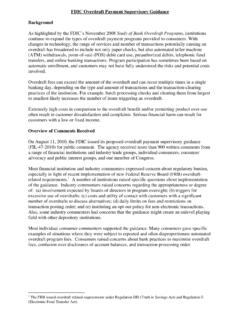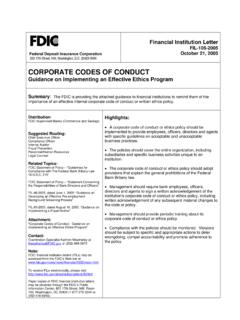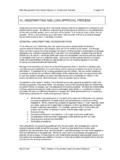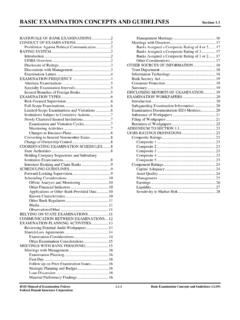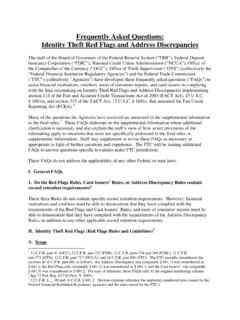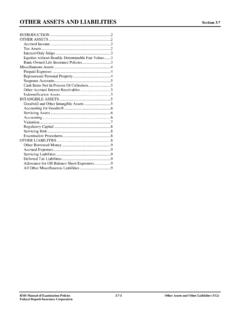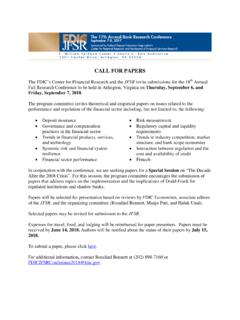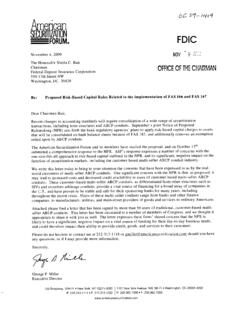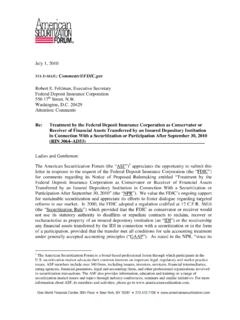Transcription of Frequently Asked Questions for Financial Institutions ...
1 1 Frequently Asked Questions for Financial Institutions affected by the Coronavirus Disease 2019 (Referred to as COVID-19) As of May 27, 2021 Working with Borrowers 1. Payment Accommodations. Would it be acceptable for a bank to offer borrowers affected by COVID-19 payment accommodations, such as allowing borrowers to defer or skip some payments or extending the payment due date. Yes. The FDIC encourages Financial Institutions to provide borrowers affected in a variety of ways by the COVID-19 outbreak with payment accommodations that facilitate their ability to work through the immediate impact of the virus. Such assistance provided in a prudent manner to borrowers facing short-term setbacks could help the borrower and a community to recover. The FDIC understands that effective loan accommodation programs may involve protracted resolutions, but all should be ultimately targeted toward loan repayment.
2 Financial Institutions may want to consider addressing any deferred or skipped payments by either extending the original maturity date or by making those payments due in a balloon payment at the maturity date of the loan. When deferring or skipping payments, providing borrowers with accurate disclosures that are consistent with federal and state consumer protection laws will help to avoid any misunderstandings relative to the changes in the terms. Financial Institutions can call their FDIC Regional Office, which can assist them by discussing key considerations and regulations on payment accommodations and disclosures. 2. Documentation. What type of documentation should Financial Institutions maintain relative to providing an accommodation to a borrower affected by COVID-19? Financial Institutions should maintain appropriate documentation that considers borrowers payment status prior to being affected by COVID-19, and borrowers payment performance according to the changes in terms provided by the payment accommodation.
3 Documentation could also include the borrowers recovery plans, sources of repayment, additional advances on existing or new loans, and value of the collateral. 3. Reporting Delinquent Loans. Do loans that receive payment accommodations have to be reported as delinquent or non-performing? Borrowers who were current prior to becoming affected by COVID-19 and then receive payment accommodations as a result of the effects of COVID-19 generally would not be reported as past due. Each Financial institution should consider the specific facts and circumstances regarding its payment accommodations for borrowers affected by COVID-19 in determining the appropriate reporting treatment in accordance with generally accepted accounting principles (GAAP) and regulatory reporting instructions. Past due reporting status in regulatory reports should be determined in accordance with the contractual terms of a loan, as its terms have been revised under a payment accommodation or similar program provided to an individual customer or across-the-b oard to all affected customers.
4 Accordingly, if all payments are current in accordance with the revised terms of the loan, the 2 loan would not be reported as past due. For loans subject to a payment deferral program on which payments were past due prior to the borrower being affected by COVID-19, it is the FDIC s position that the delinquency status of the loan may be adjusted back to the status that existed at the date of the borrower became affected , essentially being frozen for the duration of the payment deferral period For example, if a consumer loan subject to a payment deferral program was 60 days past due on the date of the borrower became affected by COVID-19, an institution would continue to report the loan in its regulatory reports as 60 days past due during the deferral period (unless the loan is reported in nonaccrual status or charged off).
5 4. [As of 4/14/2020] Troubled Debt Restructurings (TDRs). When does a payment accommodation become a TDR? Modifications of loan terms do not automatically result in TDRs, and, as described below, Institutions generally do not need to categorize COVID-19-related modifications as TDRs. According to generally accepted accounting principles (GAAP), a restructuring of a debt constitutes a TDR if the creditor, for economic or legal reasons related to the debtor s Financial difficulties, grants a concession to the debtor that it would not otherwise Under Section 4013 of the CARES Act, banks may elect not to categorize loan modifications as TDRs if they are (1) related to COVID-19; (2) executed on a loan that was not more than 30 days past due as of December 31, 2019; and (3) executed between March 1, 2020, and the earlier of (A) 60 days after the date of termination of the National Emergency or (B) December 31, 2020.
6 For all other loan modifications, the agencies have confirmed with staff of the Financial Accounting Standards Board (FASB) that short-term modifications made on a good faith basis in response to COVID-19 to borrowers who were current prior to any relief, are not TDRs. This includes short-term ( , six months) modifications such as payment deferrals, fee waivers, extensions of repayment terms, or other delays in payment that are Borrowers considered current are those that are less than 30 days past due on their contractual payments at the time a modification program is implemented. Examiners will exercise judgment in reviewing loan modifications, and will not automatically adversely risk rate credits that are affected by COVID-19. Regardless of whether modifications result in loans that are considered TDRs or are adversely classified, agency examiners will not criticize prudent efforts to modify the terms on existing loans to affected customers.
7 Please refer to interagency supervisory guidance ,3 which provides more information on TDRs. 1 The TDR designation is an accounting categorization, as promulgated by the FASB and codified in Accounting Standards Codification (ASC) Subtopic 310-40, Receivables Troubled Debt Restructurings by Creditors (ASC 310- 40). 2 According to ASC 310-40, factors to be considered in making this determination, which could be qualitative, are whether the amount of delayed restructured payments is insignificant relative to the unpaid principal or collateral value of the debt, thereby resulting in an insignificant shortfall in the contractual amount due from the borrower, and whether the delay in timing of the restructured payment period is insignificant relative to the frequency of payments due under the debt, the debt s original contractual maturity, or the debt s original expected duration.
8 3 See at 3 5. TDR Categorization. Will FDIC examiners make banks categorize all loan modifications related to COVID-19 events as a TDR? No. The FDIC continues to encourage Financial Institutions to work with borrowers who may be impacted by COVID-19, by offering to modify, extend, suspend, or defer the repayment terms. FDIC examiners have been directed to exercise significant flexibility in reviewing credits that are impacted by COVID- 19 and will work with Financial Institutions relative to any reporting issues. Please refer to interagency supervisory guidance ,4 which provides more information on TDRs. 6. Accommodations for Loans Guaranteed by the Small Business Administration. Can Financial Institutions provide payment accommodations to borrowers whose loans are guaranteed by the SBA? Financial Institutions can provide payment accommodations that modify, extend, suspend, or defer the repayment terms on SBA-guaranteed loans to borrowers affected by COVID-19.
9 While the majority of payment accommodations do not require SBA approval, Financial Institutions should determine what types of modifications require the SBA s approval. More information regarding the SBA s programs is available at 7. Nonaccrual Status, Allowance for Credit Losses (ACL), Allowance for Loan and Lease Losses (ALLL), and Charge-offs. Do loans that receive payment accommodations have to be reported as nonaccrual, reflect appropriate ACL or ALLL, and be charged off? Each Financial institution should refer to the applicable regulatory reporting instructions, as well as its internal accounting policies, in determining whether to report loans with accommodations to customers affected by COVID-19 as nonaccrual assets in regulatory reports. (See also the response to Questions 3 and 5). Each institution should maintain an appropriate allowance allocation for these loans, considering all information available prior to filing its reports about their collectability.
10 As information becomes available that indicates a specific loan will not be repaid, Institutions should preserve the integrity of their internal loan grading methodology and maintain appropriate accrual status on affected credits. Financial Institutions should refer to the charge-off guidance in the instructions for the Consolidated Reports of Condition and Income. 4 See at 4 Operational Issues 1. Alternative Service Options. In an effort to protect employees and customers, can a Financial institution limit access to branch offices, such as by limiting access to the use of the drive- up window? Yes. Financial Institutions can consider alternative service options to provide access to Financial services. Financial Institutions may want to remind customers of the various ways they can access banking services without physically coming to a facility, such as managing their accounts online, performing transactions at an automated teller machine (ATM), using telephone banking, or accessing a mobile banking application.
